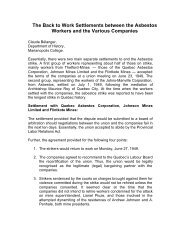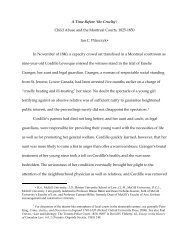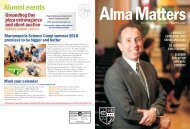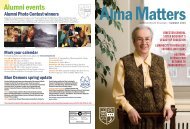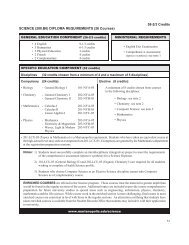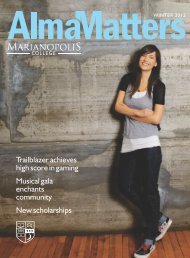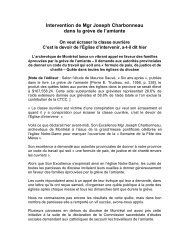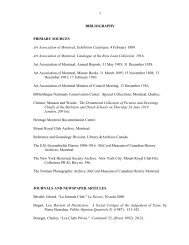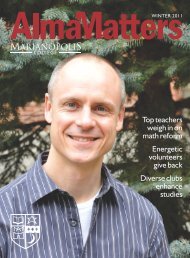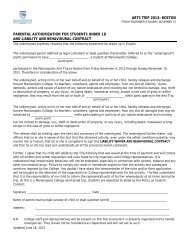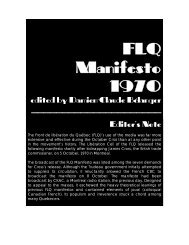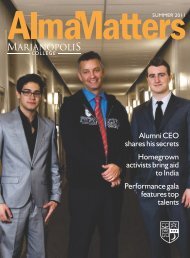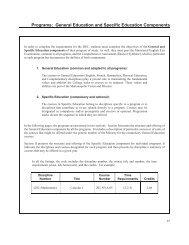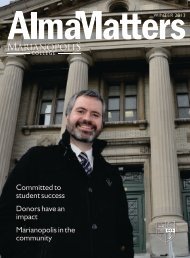Liberal Artsof evolution; the first debates aboutwomen's rights and capital punishment;and the first attempts at copingwith mass industrialization andurbanization through mass education.This course looks at the nineteenthcentury as an age of new ideas andrapid change and examines thewritings of eminent European writers.Wars: Just and Unjust345-LPH-MS (3-0-3) 2 creditsThis course seeks to examine themoral and ethical issues involved inthe decision by one (or more)independent state(s) to use forceagainst another sovereign state. Inparticular, it seeks: 1) To assesswhether armed intervention in theinternal affairs of a sovereign state isever justified. If it is, under whatconditions can it be justified? 2) Toexamine the moral implications of thedecision to go to war as well as theethical issues of the manner in whichthe war is conducted. 3) To investigatethe relationship between theexisting moral values and thejustification for war and acceptablebehaviour in wartime against thebackdrop of the broad sweep ofhistory from the Napoleonic Warsto the present.Art History (520)Art historians study the historicaldevelopment of the visual arts—painting, sculpture, architecture,photography and more—byexamining the materials, techniques,forms and subject matter chosen byartists while taking into account thevarious contexts in which art isproduced. Understanding the social,intellectual, religious and politicalconditions under which artists livedand worked allows us to gain agreater understanding of how art canreflect, as well as affect, other areasof human life. Courses in art historyoffer students the opportunity toexpand their visual literacy and tolearn how to describe and interpretworks of art: important skills in anincreasingly image-based culture.Thematic Studies In History of Art:Medieval and Renaissance Art520-903-MS (3-0-3) 2 creditsAn increasingly humanistic worldview began to emerge in WesternEurope between the eleventh and theearly sixteenth centuries, or in arthistorical terms, from Romanesque toHigh Renaissance. The ways inwhich humanism affected the riseof naturalism, individualism, andclassicism in the arts provides acentral theme for students learning tounderstand the differences betweenthe later Middle Ages and theRenaissance in painting, sculptureand architecture.Civilization (332)Ancient World332-115-MS (2-1-2) 1.66 creditsLiberal Arts students onlyAs an introduction to antiquity, thiscourse investigates the origins of thethreads which, woven together, havecreated the tapestry of WesternCivilization from its beginnings:Prehistory and the birth of civilization(Bronze Age) to Greek and RomanCivilizations.History (330)The study of history helps studentsunderstand the past and presentworld, enrich their cultural life, andbroaden their horizons. Historycourses develop skills in criticalthinking, analysis and synthesis,improve literacy and communicationas well as understanding of socialdynamics. Our history coursesemphasize the multiple interpretationsthat can be given to historical factsand events.Post-Classical History I330-101-MS (2-1-2) 1.66 creditsLiberal Arts students onlySpanning the fall of the classicalempires to the French Revolution,this course places the majordevelopments of European historywithin the context of the wider world.Principal emphases include the postclassicalworld, the rise of Islam, the“civilization” of the barbarians, therecovery of Europe, the emergence ofnations, European colonialism, andthe age of revolutions. With all topicsa holistic approach to the subjectmatter – whether political, social,economic, gender-analytical, etc. – ispursued and current historiographicalcontributions are taken into account.Post-Classical History II: The 19thand 20th Centuries330-102-MS (2-1-2) 1.66 creditsLiberal Arts students onlyBy the nineteenth century, Europehad become entwined througheconomics and politics with mostparts of the world. This relationshipcontinues but changes in thetwentieth century. Major emphasesinclude the industrial revolution, theage of imperialism, World Wars Iand II, the bi-polar and post-colonialworld, and the implications of thedemise of the Soviet Union and theemergence of a uni-polar world.As with Post-Classical History I,students pursue a holistic approachto the subject matter which takes intoaccount current historiographicalcontributions.106
Liberal ArtsPhilosophy (340)Philosophy is variously defined as thelove of wisdom, the science of thesciences, or as the unrelentingexamination of the fundamentalprinciples underlying science,religion and morality. Perhaps mostcharacteristic of the philosophicalenterprise in general is the unendingand uncompromising pursuit of truth,arrived at through critical evaluationand careful consideration of all sidesof an issue.Ancient Philosophy340-910-MS (3-0-3) 2 creditsThis course provides a survey ofancient Greek philosophy, from thepre-Socratic thinkers and Socrates,through to Plato and Aristotle. Thesethinkers and their ideas are examinedin terms of their historical context,especially insofar as they influencedone another. As well as examiningthe major philosophical areas ofmetaphysics, theory of knowledge,and ethics; this course gives specialemphasis to the way in which thesethinkers laid the foundation forwestern thought in the natural andthe social sciences.Early Modern Philosophy340-912-MS (3-0-3) 2 creditsThis course offers a survey of themajor figures in Western philosophyduring the 17th and 18th centuries, aperiod which marked the transitionfrom the medieval to the modernapproach in both philosophy andscience. After a general survey of theperiod itself, we focus on some of thecentral issues in philosophy duringthis period: epistemology (what canwe know?), metaphysics (what is thenature of reality?) and ethics (howshould we act?). In examining thework of Descartes, Hume and othermodern thinkers students willdiscover theories that have shapedthe development of both philosophyand science in the modern world.Religious Studies (370)Judaism, Christianity and Islam:An Introduction to Jewish,Christian and Muslim Scriptures370-121-MS (3-0-3) 2 creditsThe purpose of this course is tointroduce students to the scriptures ofthe three great monotheistic religionsof the West. The course is subdividedinto three units of study. Studentsbegin with Judaism and the Hebrewscriptures, proceed to Christianity andthe New Testament, and concludewith Islam and the Qur’an. In eachcase, students explore a few foundingscriptural passages and somesubsequent interpretations of them.Methodology (300, 360)Required Courses for Liberal ArtsStudents:Research Methods in Liberal Arts300-302-MS (2-1-2) 1.66 creditsThis course identifies and explainsthe principal stages and fundamentalconcepts of research common to allthe Liberal Arts, and instils a senseof how expository prose, essential toworks of research, should be written.Principles of Logic & Mathematics360-124-MS (3-1-3) 2.33 creditsThis course strives to explore anddemonstrate the nature of mathematicalreasoning. The student isintroduced to the rules of logicand logical reasoning and how themethods of logic can be employedto construct valid arguments.Mathematical reasoning is presentedas the application of logical principlesto appropriate sets of axioms orpostulates and different methods ofproof are explored. Throughout thecourse, the student is encouraged toconstruct logical arguments andproofs and apply these methods tomathematics.History & Methodology of Science360-125-MS (3-1-3) 2.33 creditsThe identity of and our attitude toscience is determined by the waywe organize both the ideas and themethods used to verify them. Theconventional, or lineal, approachshows science as advancing froma mythopoeic understanding ofexistence to our current empiricalone, a process as orderly andobjective as contemporary scienceitself. When approached from either acontingency or from a culturalperspective, however, science has ahuman face more fascinating andevocative than it is objective andorderly.Integrative Project: Liberal Arts360-126-MS (1-2-3) 2 creditsThe integrative project is designedto allow students to bring togetherseveral disciplines in a final project.It is the culmination of their LiberalArts studies. The choice of projecttopic is flexible enough to allow themmaximum freedom. Research ispresented in a seminar and the finalproject in the form of an essay, panelpresentation, debate or a creativeproject, such as a play or exhibitionof art work.107
- Page 2 and 3:
VISIONMarianopolis College, drawing
- Page 4 and 5:
GENERAL INFORMATION: Introduction t
- Page 6 and 7:
AdmissionsOUT-OF-PROVINCEAPPLICANTS
- Page 8 and 9:
Financial Information• Birks Fami
- Page 10 and 11:
Financial InformationConfirmation F
- Page 12 and 13:
Academic Information• Failure (EC
- Page 14 and 15:
Academic InformationThose who are a
- Page 16 and 17:
Rules and Regulationsand whether su
- Page 18 and 19:
EDUCATIONAL RESOURCES & SERVICESAss
- Page 20 and 21:
Educational Resources and ServicesS
- Page 22 and 23:
CHOOSING A PROGRAMDiploma Programs
- Page 24 and 25:
CertificatesSpecial InterestCertifi
- Page 26 and 27:
Programs: General Education and Spe
- Page 28 and 29:
General EducationGENERAL EDUCATION
- Page 30 and 31:
General Education: Englishidentifyi
- Page 32 and 33:
General Education: Englishas the fi
- Page 34 and 35:
General Education: Englishintended
- Page 36 and 37:
General Education: Frenchand curren
- Page 38 and 39:
General Education: Frenchce cours t
- Page 40 and 41:
General Education: HumanitiesHumani
- Page 42 and 43:
General Education: Humanitiesunders
- Page 44 and 45:
General Education: Humanitiespracti
- Page 46 and 47:
General Education: Humanitiespracti
- Page 48 and 49:
General Education: Physical Educati
- Page 50 and 51:
General Education: ComplementaryCom
- Page 52 and 53:
General Education: ComplementaryMod
- Page 54 and 55:
SECTSpecificEducation Component- Sc
- Page 56 and 57:
Science: Biology - ChemistryBiology
- Page 58 and 59: Science: Mathematics - PhysicsR and
- Page 60 and 61: 56-2/3 to 58 CreditsSOCIAL SCIENCE
- Page 62 and 63: Social Science: Profiles - General
- Page 64 and 65: Social Science: Psychology ProfileE
- Page 66 and 67: Social Science: Law, Society and Ju
- Page 68 and 69: Social Science: Honours CommerceHon
- Page 70 and 71: Social Science: Anthropology - Biol
- Page 72 and 73: Social Science: History - Mathemati
- Page 74 and 75: Social Science: Political Sciencedi
- Page 76 and 77: Social Science: Religion - Sociolog
- Page 78 and 79: 54-2/3 CreditsCREATIVE ARTS, LITERA
- Page 80 and 81: Creative Arts, Literature and Langu
- Page 82 and 83: Creative Arts, Literature and Langu
- Page 84 and 85: Creative Arts, Literature and Langu
- Page 86 and 87: Creative Arts, Literature and Langu
- Page 88 and 89: Creative Arts, Literature and Langu
- Page 90 and 91: Creative Arts, Literature and Langu
- Page 92 and 93: 58-2/3 CreditsMUSIC (501.A0) DIPLOM
- Page 94 and 95: MusicEar Training and Theory IV551-
- Page 96 and 97: 59-1/3 CreditsARTS AND SCIENCES (70
- Page 98 and 99: Arts and Sciences: English - Humani
- Page 100 and 101: Arts and Sciences: Art History - Ar
- Page 102 and 103: Arts and Sciences: Mathematics - Mu
- Page 104 and 105: Arts and Sciences: Multidisciplinar
- Page 106 and 107: 56-2/3 to 58 CreditsLIBERAL ARTS (7
- Page 110 and 111: Liberal ArtsOptionalIn addition to
- Page 112 and 113: Teaching FacultyFLEISCHER, George T
- Page 114 and 115: Teaching FacultyTRILLER, Bernice Sh
- Page 116: INDEX II: Programs and CoursesGener



